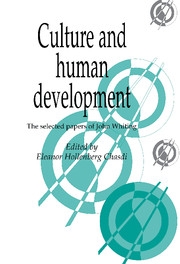Book contents
- Frontmatter
- Contents
- List of figures
- Preface
- Acknowledgments
- Introduction: John Whiting and anthropology
- Fifty years as a behavioral scientist: autobiographical notes
- Part I Theory and methods
- Part II Environment and history
- Part III Moral development
- Introduction
- 6 Sorcery, sin, and the superego: a cross-cultural study of some mechanisms of social control
- 7 Resource mediation and learning by identification
- Part IV Gender development
- Part V Development of social behavior
- Bibliography
- Complete bibliography of John W. M. Whiting's work
- Index
6 - Sorcery, sin, and the superego: a cross-cultural study of some mechanisms of social control
Published online by Cambridge University Press: 23 December 2009
- Frontmatter
- Contents
- List of figures
- Preface
- Acknowledgments
- Introduction: John Whiting and anthropology
- Fifty years as a behavioral scientist: autobiographical notes
- Part I Theory and methods
- Part II Environment and history
- Part III Moral development
- Introduction
- 6 Sorcery, sin, and the superego: a cross-cultural study of some mechanisms of social control
- 7 Resource mediation and learning by identification
- Part IV Gender development
- Part V Development of social behavior
- Bibliography
- Complete bibliography of John W. M. Whiting's work
- Index
Summary
If one is to consider the problem of motivation in cross-cultural perspective, there are a number of different approaches one might take. The first would be to investigate primary drives and to explore the habits and behavior systems that have developed as a means for satisfying these drives. This would lead to, for example, a study of the economic institutions that have been built up in various societies for the satisfaction of the hunger drive; a study of marriage customs as they relate to the satisfaction of the sex drive; shelter and clothing as a response to extremes of temperature. Another important aspect of motivation, as it is manifested at the cross-cultural level, is a consideration of those motives opposed to the immediate satisfaction of primary drives – motives which have been referred to as fear, anxiety, guilt, shame, and the sense of sin – that is, those motives which underlie social control. It is a consideration of some aspects of this latter type of motivation which will be the theme of this paper.
It is apparent from a study of cultures the world over that positive reinforcement alone cannot maintain a complex social system. Taboo and negative sanctions oppose the desire for immediate gratification of the members of any society and seem to be, therefore, a requirement for social living. It seems also that simple punishment for wrong-doing does not create enduring enough inhibitions for the maintenance of social order. Perhaps if the punishment were severe enough, the fear of wrong-doing might be, as was apparently the case with Solomon's dogs, partially irreversible (Solomon and Wynne 1954).
- Type
- Chapter
- Information
- Culture and Human DevelopmentThe Selected Papers of John Whiting, pp. 175 - 193Publisher: Cambridge University PressPrint publication year: 1993
- 2
- Cited by

